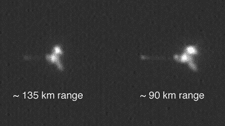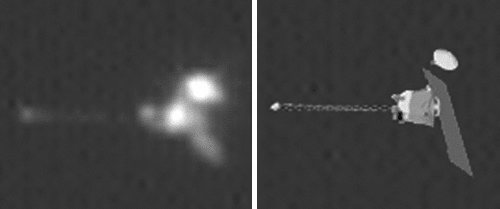Amir Alexander • May 19, 2005
Martian Orbiter Takes Pictures of Neighboring Crafts Passing By
Even though a human mission to Mars is still far off in the future, there’s no denying that the Red Planet has become a bustling place these days. Two rovers, Spirit and Opportunity, have been ranging the Martian wilderness for over a year now; several recent wrecks, including NASA’s Mars Polar Lander and Mars Climate Orbiter, as well as ESA’s Beagle II, dot the planet; numerous landers from past missions, such as the two Vikings and Mars Pathfinder sleep silently on the surface, awaiting a future visitor; and no less than three orbiters - NASA’s Mars Global Surveyor and Mars Odyssey, and ESA’s Mars Express – are circling the planet taking note of all that is happening below.

With so much traffic swirling on and above Mars, it is not altogether surprising that these robotic emissaries are finally taking a break from surveying the Red Planet, and are instead turning their sites on each other. Two weeks ago the Mars Global Surveyor spotted “something,” which just might be the wreckage of the lost Mars Polar Lander. Now, for the first time in the annals of planetary exploration, a spacecraft orbiting a planet other than Earth has taken pictures of other spacecraft in its vicinity.
During April 2005, the Mars Global Surveyor happened to pass relatively close to Odyssey and Mars Express. This has happened many times before, and on all occasions these lonely ambassadors from Earth, so far away from home, have passed each other like strangers in the night. Not this time. Using the Mars Orbital Camera (MOC), which had served it so well in its detailed survey of the Martian surface, the Mars Global Surveyor turned to face its fellow orbiters and took their picture. What resulted were remarkably clear pictures of human-made spacecraft orbiting and alien world. Both the Odyssey and the Mars Express were last seen by humans years ago, before they were launched on their way to a different world.

The image of the Odyssey actually appears twice within the same frame, once from a distance of 90 kilometers (56 miles) and again from a distance of 135 kilometers (84 miles). This double appearance came about because of the diverging orbits of the two spacecrafts, which first took Odyssey out of the MOC’s field of vision, but then returned it again during the same exposure.
The image of the Mars Express is in fact a composition of two pictures taken of the spacecraft by the MOC from distances of 250 and 370 kilometers (155 and 230 miles). Due to the large distance between the Mars Global Surveyor and the Mars Express, and their great relative speed, the image is more blurred and less detailed than that of Odyssey. Nevertheless the general outlines of the European spacecraft are clearly discernible.

With more missions to Mars now in the works, the day may not be far when such encounters between human surrogates will occur not just in orbit, but on the planet’s surface as well. And when that happens, perhaps encounters between real humans will not be far behind.
Support our core enterprises
Your support powers our mission to explore worlds, find life, and defend Earth. You make all the difference when you make a gift. Give today!
Donate

 Explore Worlds
Explore Worlds Find Life
Find Life Defend Earth
Defend Earth

